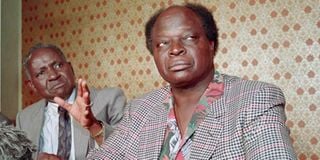Premium
How Mwai Kibaki was packaged to block 'tyrannical' Kenneth Matiba rule in 1992

Kenneth Matiba (left) and Mwai Kibaki addressing the press in Nairobi in 1992.
It can now be revealed that Mwai Kibaki was packaged by the international community and local patriots to contest the 1992 General Election so as to block the opposition firebrand Kenneth Matiba from seizing state power.
Longtime career administrator Joseph Kaguthi, who has served all the four governments since independence says "omitting the sensitivities around the issue, it can safely be said Kibaki saved Kenya from going down the ditch had Matiba ascended to power".
Mr Kaguthi reveals that "generals fight the war but rarely gain the credit of the win and that was Matiba...he was good for the democratisation battle but not good for the presidency".
He says the diplomatic community was happy with Mr Matiba as an activist for multipartyism "but many developed economies did not fancy him becoming the President".
Kenyans’ apparent embrace of Matiba as the saviour who deserved to be elected the third President sent chills through diplomatic circles and among the who’s who in local economic circles.
Mr Kaguthi's words are corroborated by a now retired senior diplomat who leads a quiet life in Murang'a County.
"I was serving in Germany then and there was a lot of concern about Matiba's understanding about power ... He was not a man who appeared to know the sensitivities of power handling and how to safeguard dynamics in interests that go with consumers of that power," the former diplomat said.
The world, he said, was grappling with too many African countries going bananas owing to reckless application of authority.
"The nightmare being anticipated in a possible Matiba presidency was in his declarations that he did not value Asians in the Kenyan trading space, that his rule would kick them out and hand the opportunity to Kenyans," he said.
Among other public declarations that pained development partners were Matiba’s pledge to throw wide open the doors of correctional facilities and release all inmates because "they had been jailed by an illegal President Daniel Moi's regime".
But though Moi’s regime was regarded as a dictatorship, it was not illegal. It had been put in place through universal suffrage, except that Kenyans did not have much freedom of choice in a one-party state.
Mr Kaguthi says Mr Matiba had been profiled as "an explosive presidential material who was finding it difficult to conceal hard feelings about the incumbent and the system that had imprisoned and tortured him in the fight for multiparty democracy".
When Moi ceded ground under pressure in 1992 and agreed to change the law to pave the way for the first multiparty elections, those who loved Kenya acted.
"Mr Kibaki all along appeared all content to go into the 1992 elections while in Kanu. He had publicly declared that agitating for multiparty democracy and trying to dislodge Kanu and Moi from power was like ‘trying to cut down a fig tree with a razor blade’.”
But beneath the waves, a series of events were underway, some financed by Moi himself to survive the Matiba euphoria that was peaking and others bankrolled by the business community and foreigner actors.
Nominated Senator Beth Mugo, a relative of the Kenyatta family, states that "there was unanimity of thought that Kibaki was the best for the country in the event Moi vacated office”.
"The name of Kibaki being the best pair of hands in Kenya had been floated in 1967...the proposal peaked in 1974 and he was being readied for takeover after the founding father of the nation, Mzee Jomo Kenyatta."
Mr Kaguthi reveals that Mr Kibaki joined the agitation for power when it became increasingly clear in 1977 that there was a looming transition of power. Moi took over after Jomo Kenyatta died in 1978.
Fast-forward to the 1990s, and with Moi’s rule facing its first real challenge in multiparty elections, Mr Kibaki's name came to the fore. But it was Matiba who appeared to capture the imagination of Kenyans and looked likely to win.
"I won't dwell too much on what was happening, what happened and what ended up being implemented ... Just know that ... all of a sudden Mr Kibaki developed the guts to resign, abandon the fig tree and razorblade narrative and decide that it would be sport to dislodge Moi and Kanu from power," Mr Kaguthi said.
Mr Kibaki founded the Democratic Party (DP) and entered the presidential race.
With the dominance of the Gikuyu, Embu and Meru Association (Gema) voters in the vote register, it was clear that if Matiba scooped them up and received top-ups from other regions, that would be enough to kick Moi and Kanu out of power and usher in a regime that was considered a threat to the very stability of Kenya.
With Kibaki in the race, Matiba ended up missing the ultimate prize, Moi survived the certain ejection he would have suffered if Kibaki had not run and Kenya avoided an unpredictable Matiba rule.
Moi received 1,962,866 (36.35 percent), Matiba romped in second with 1,404,266 (26 percent), and Jaramogi Oginga Odinga, who our sources reveal was also approached to help the country escape the trap of a Matiba presidency, won 944,197 (17.48 percent).
Had Kibaki's 1,050,617 votes (19.45 per cent) ended up in Matiba's tally, Moi would have lost the 1992 vote.
On April 15, 2018, Matiba died, credited with the fight for democracy but not becoming President, just like field marshal Dedan Kimathi died on February 18, 1957 credited with jungle warfare for self-rule but getting no taste of power.
Mr Kibaki soldiered on in his trials for the State House job and nabbed it in 2002. He lived to rule for two terms (2002-2013), now unanimously described as the golden rule from the great, as tributes pour in following his death on April 21.





